Possessive Pronouns
Showing Ownership
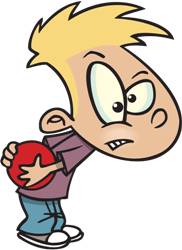 Possessive pronouns
are pronouns that indicate ownership.
Possessive pronouns
are pronouns that indicate ownership.Click Here for Step-by-Step Rules, Stories and Exercises to Practice All English Tenses
A pronoun is a word that is used in place of a noun.
For example:
Let's consider this sentence:
Tom has the red ball.
We could replace Tom with He, which is a pronoun.
He has the red ball.
Here's another example:
Joe and Karen like cats.
We could replace Joe and Karen with they, which is a pronoun.
They like cats.
Possessive Pronouns
Possessive pronouns show ownership. They tell the reader that something belongs to somebody or something.These are the possessive pronouns and the subjects they represent:
| Subject | Possessive Pronoun |
| I | Mine |
| You (singular) | Yours |
| He | His |
| She | Hers |
| It | Its |
| We | Ours |
| You (plural) | Yours |
| They | Theirs |
| Who | Whose |
1. Mine
The possessive pronoun mine shows ownership of the subject I.Examples:
- The blond boy is mine.
(I am the blond boy's mother.)
- The dog you found is mine.
(I own that dog.)
- The blue toothbrush is mine.
(I own the blue toothbrush.)
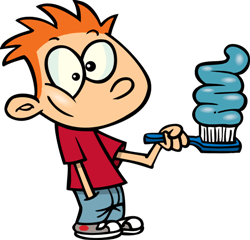
2. Yours (singular and plural)
The possessive pronoun yours shows ownership of the subject you.The subject you can represent a singular or plural subject.
Singular Examples:
Plural Examples:
- The pink toothbrush is yours.
(You own the pink toothbrush.)
- Nick, I think that dog is yours.
(Nick, you own the dog.)
- The blue present is yours.
(You get the blue present.)
Plural Examples:
- Tom and Sandy, is this house yours?
(Do you both own the house?)
- These presents are yours.
(The presents belong to all of you.)
- These band uniforms are yours
this year.
(The uniforms belong to the band members.)
3. His
The possessive pronoun his shows ownership of the subject he.Examples:
- The old car is his.
(He owns the old car.)
- The book is his.
(He owns the book.)
- I think that bike is his.
(He owns the bike.)

4. Hers
The possessive pronoun hers shows ownership of the subject she.Examples:
- The children are hers.
(She is the mother of the children.)
- The blue house is hers.
(She owns the blue house.)
- The coat I found is hers.
(She owns the coat.)
5. Its
The possessive pronoun its shows ownership of the subject it.Examples:
These examples may sound strange, but they are grammatically correct. - The blue doghouse is its.
(The blue doghouse belongs to it.)
- Its
is the green one.
(The green one belongs to it.)
- Those game pieces are its.
(The pieces belong with the game.)
In American English, it is more common to use the possessive adjective form of its, which is explained at the end of this lesson.
A possessive adjective always comes before a noun.
For Example:
We could say,
"Its doghouse is blue."
or
"Those are its game pieces."
We could say,
"Its doghouse is blue."
or
"Those are its game pieces."
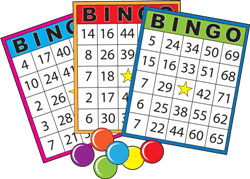
Special note about its vs. it's:
Its and it's are not the
same word.
Its = ownership
It's = a contraction meaning it is.
It's = a contraction meaning it is.
- Incorrect:
The bird is in it's nest.
(The bird is in it is nest).
- Correct:
The bird is in its nest.
- Incorrect:
I think its nine o'clock.
- Correct:
I think it's nine o'clock.
(I think it is nine o'clock.)
6. Ours
The possessive pronoun ours shows ownership of the subject we.Examples:
- The swimming pool is ours.
(We own the swimming pool.)
- Those horses in the barn are ours.
(We own the horses in the barn.)
- Ours
is the green car.
(We own the green car.)
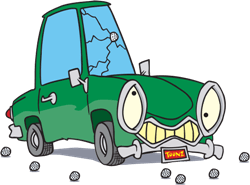
7. Theirs
The possessive pronoun theirs shows ownership of the subject they.Examples:
- The three bikes are
theirs.
(They own the bikes.)
- The sleeping bags are theirs.
(They own the sleeping bags.)
- Those children are theirs.
(They are the parents of the children.)
Possessive Adjectives
Don't confuse possessive pronouns with possessive adjectives.Possessive adjectives show ownership, but they always come before a noun. They modify the noun.
The possessive adjectives are:
- my
- your (singular and plural)
- his
- her
- its
- our
- their
possessive adjective + noun
- My
house
is green.
(The green house belongs to me. or I own the green house.)
- Is that your
dog?
(The dog belongs to you.)
- That is his
bicycle.
(He owns the bicycle.)
- Her
mom
is tall.
(The girl's mom is tall.)
- The horse broke its
leg.
(The horse has a broken leg.)
- Do you want to come over to our
house?
(The house belongs to us.)
- Their
car
broke down.
(The car that broke down belongs to them.)
- I wonder whose
bike
is parked there?
(The bike belongs to someone.)
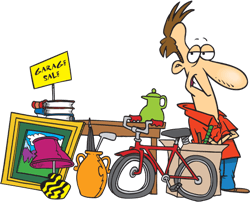
These were the uses of possessive pronouns. Now that you know them, it is time to practice: Illustrated Worksheet on Possessives Forms.
Get Updates, Special Offers, and English Resources
Download your FREE GIFT (the first two chapters of
English Short Stories Book and Workbook)
as soon as you join!

By submitting your email, you consent to receiving updates and newsletters from us and to the sharing of your personal data with third parties for the purposes of sending you communications. We will not spam you. You can unsubscribe at any time. For more information, please see our privacy policy.






